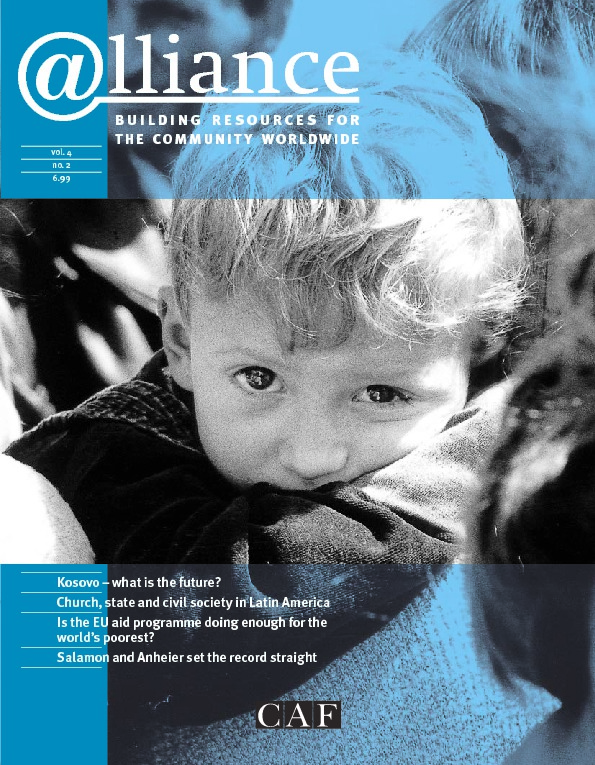In 1994 34 chambers and associations representing many of Chihuahua’s 29,000 employers joined in an ambitious enterprise. The aim: to improve the quality of life of the people of Chihuahua. The means: every employer in the state was to pay an extra 10 per cent on the payroll tax – then 2 per cent of payroll. The money would be collected monthly by the state government and paid into a special fund.
An earlier fund had been raised following serious flooding in Chihuahua in 1991. The government was desperately short of money for the rebuilding of Chihuahua City and wanted to raise the payroll tax for a year to pay for it. The employers’ organizations agreed to pay the increase on condition that the money was paid into a separate fund, to be administered by them.
In 1994, inspired by the success of the first fund, it was the businessmen who took the initiative. Thirty-four business organizations approached the state governor with the suggestion that they should again pay extra payroll tax in order to support social development, but this time on a permanent basis. The governor was sympathetic to the idea and himself presented the proposal to the state congress. In April 1994 the necessary legislation was introduced and the Chihuahua Business Sector Social Fund Trust was created. Although in theory employers who had not actively promoted the idea could opt not to pay the extra tax, in fact none have done so.
A commitee with 19 volunteer business leaders from throughout the state and four government representatives was formed to administer the trust, while almost 100 business owners in nine cities agreed to help evaluate projects and possible donations.
Chihuahua Business Sector Foundation
By 1996 it had become clear that a new form of organization was needed that would allow the project to access funding from other sources and to continue beyond the expiry of the decree that presently assures the monthly revenue. As a result the Chihuahua Business Sector Foundation (FECHAC) was created to distribute the trust’s funds, keeping its existing board members and directives.
This unique initiative has raised around US$3.5 million a year since 1994. This year, owing to a further tax increase, the income is expected to increase to $5 million. During the debate concerning the payroll tax increase, which generated widespread opposition among employers, the government raised the possibility of eliminating the trust’s share to reduce the impact of the increase. But the employers refused: regardless of the level of the tax, their philanthropic project was not to be disturbed.
The Foundation makes grants mostly for construction, refurbishment, equipment and vehicles for organizations working in the areas of health, education and income generation for the poor. Fifty per cent of the grant-making is designated for rural areas of the state, mostly the Sierra Tarahumara and its indigenous communities. The other half is for the nine municipalities, according to the level of tax revenue generated by each.
Over five years, FECHAC has funded over 700 projects, and through it the business owners of this northern state have invested over $7 million dollars in more than 120 communities throughout Chihuahua.
Although this is an impressive amount, the fact is that FECHAC has managed to disburse less than half the money raised so far. The stumbling block is the lack of NGOs with the organizational capacity to carry out social programmes.
FECHAC has also improved the public perception of the business sector, in a state where a large proportion of the population works for low-paying foreign manufacturing plants.
The future
The Foundation is a model that could be replicated in other parts of Latin America. This visionary social investment scheme has inspired business people in many cities. Sonora, a neighbouring Mexican state, is currently in the process of approving a similar tax, following in the steps of the Chihuahua business organizations.
FECHAC has also linked with different organizations to promote philanthropy and improve the capacity of Chihuahua’s non-profits. The first Latin American workshop of the Prince of Wales Business Leaders Forum’s INSIGHT programme was hosted by FECHAC, involving business, government and social leaders from four Mexican states and six countries. The Inter American Foundation is co-funding their community banking programme.
Right now, the Foundation faces several challenges as the expiry of the trust approaches. Board and staff members are working hard to get the political support that is needed to assure the project’s revenue beyond the year 2000.
For further information contact Jenny Zapata at FECHAC.
Tel +52 14 132 020
Fax +52 14 133 920
E-mail fechac@online.com.mx
Samuel G Kalisch is founder and president of the Chihuahua Business Sector Foundation.
The Mexican government and civil society
Civil society in Mexico expanded rapidly after the 1985 earthquake, but the government’s attitude is still not a favourable one. While welfare organizations – those involved in education, health, research, etc – pay no taxes except VAT and payroll tax, and their donors are eligible for tax deductions, NGOs involved in the environment, human rights, community development and civic education receive no such benefits. These groups amount to some 40 per cent of the non-profit sector.
Latin America Civil society Features
ADDING ETHICAL VALUE TO BUSINESS OPERATIONS
Increasingly, stakeholders are demanding that companies make an active effort to build a better, fairer and environmentally sustainable society in whichever country they operate. In Brazil, the Ethos Institute of Business and Social Responsibility was created in July 1998 to help companies understand and apply the ethics of corporate social responsibility in their day-to-day business operations.
The small proportion of Brazilian companies which are socially engaged often express their commitment through philanthropy alone. Ethos’s primary objectives are to increase that proportion and at the same time to expand the corporate social agenda to encompass issues such as employment policies and ecological and community impact — in other words, to encourage companies to recognize their responsibilities in relation to all those affected by their activities.
Ethos was the initiative of a group of business people who believe that their social role goes beyond their participation in the national economy, creating jobs and paying taxes. Eight years earlier they had been involved in founding the Abrinq Foundation for Children’s Rights – a non-profit organization created in 1990 to develop assistance projects and advocacy campaigns focused on the well-being of homeless, exploited or at-risk children. Its present activities benefit more than 600,000 children throughout Brazil.
Barely nine months old, the Ethos Institute has 142 member companies, of all sizes and drawn from every economic sector. A prior survey of 47 per cent of these companies shows that their total annual turnover exceeds US$70 billion, representing 10 per cent of Brazil’s GDP today, and that they employ over 172,000 workers.
The Ethos Institute is a founder member of the Forum on Business and Social Responsibility in the Americas, an alliance of business organizations committed to the promotion of corporate social responsibility.
An ethical image is a fundamental asset for any company, critical for corporate profits and survival in the long run. In today’s global economy, it is no longer possible to be ethical in the United States and employ child labour in Indonesia, to be ethical in Europe and participate in corrupt schemes elsewhere in the world.
For further information about the Ethos Institute, contact Oded Grajew on +55 11 3068 8539 or at ethos@ethos.org.br






Comments (0)